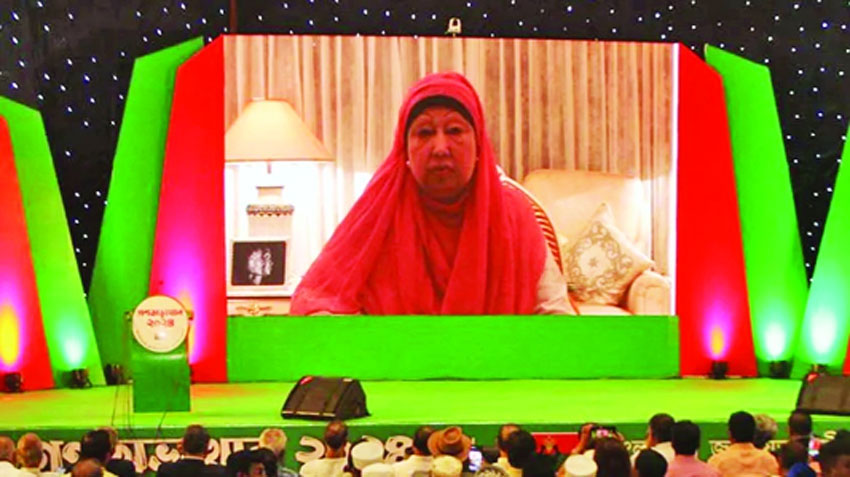- 2021-10-06 00:46:49
- LAST MODIFIED: 2026-02-14 11:26:47
Social media Facebook giant fuels division harms children: Whistleblower

Photo Collected :
International Desk: Dhaka, Oct-06,
A Facebook whistleblower told US lawmakers Tuesday that the social media giant fuels division harms children and urgently needs to be regulated, drawing pledges Congress would take up long-delayed action.
The testimony by ex-employee Frances Haugen has fueled one of Facebook's most serious crises yet, and prompted a denial from CEO Mark Zuckerberg, who said in a post on his account that her claim the company prioritizes profit over safety was "just not true."
Haugen testified on Capitol Hill after she leaked reams of internal research to authorities and The Wall Street Journal.
"I believe that Facebook's products harm children, stoke division, and weaken our democracy," Haugen told a Senate panel.
"Congressional action is needed. They won't solve this crisis without your help," she added.
In her testimony, she emphasized the power held by a service that is tightly woven into the daily lives of billions of users.
She also noted the risks that the social media giant's platforms are fueling a contagion of eating disorders, body-shaming, and self-dissatisfaction that is particularly dangerous for young people.
"There are going to be women walking around this planet in 60 years with brittle bones because of the choices that Facebook made around emphasizing profit today," she said, referring to the impact of eating disorders.
Zuckerberg denied all the claims in a note to Facebook employees that he posted on his account, calling the argument that the company pushes content that makes people angry for-profit "deeply illogical."
"We make money from ads, and advertisers consistently tell us they don't want their ads next to harmful or angry content. And I don't know any tech company that sets out to build products that make people angry or depressed.
The moral, business, and product incentives all point in the opposite direction," he said.
Of all the claims, he said he was "particularly focused" on the ones about Facebook and children, adding that he was "proud" of the work the company has done to help young people in distress.
And he reiterated his own calls, which date back years, for the industry regulations to be updated, repeating Facebook's stance Congress was the "right body" to do that.
After Haugen's testimony, some members of Congress agreed.
"Here's my message for Mark Zuckerberg. Your time of invading our privacy, promoting toxic content, and preying on children and teens is over," said Senator Ed Markey.
"Congress will be taking action... we will not allow your company to harm our children, our families, and our democracy anymore," he added.
Senator Amy Klobuchar said she sees the whistleblower disclosures as the long-needed push to get Congress moving.
"I think the time has come for action, and I think you are the catalyst for that action," she told Haugen.
US lawmakers for years have threatened to regulate social media platforms to address criticisms that the tech giants trample on privacy, provide a megaphone for dangerous misinformation and damage young people's well-being.
- A real inflection point? -
Facebook has pushed back hard against the Journal stories underpinned by the voluminous internal studies that Haugen leaked, and even before Zuckerberg's post the company fiercely objected to her testimony on Tuesday.
A Facebook statement called her "a former product manager who worked at the company for less than two years, had no direct reports, never attended a decision-point meeting with C-level executives."
"We don't agree with her characterization of the many issues she testified about," said the statement from Lena Pietsch, director of policy communications.
Haugen, a 37-year-old data scientist from Iowa who has worked for companies including Google and Pinterest, delivered hours of testimony that showed a developed understanding of Facebook's mentality.
"A lot of the changes I'm talking about are not going to make Facebook an unprofitable company," she said. "It just won't be a ludicrously profitable company like it is today."
She returned repeatedly to the idea that Facebook is a platform where human behavior was being manipulated to keep people on the app and engaged.
Haugen noted that she believed Facebook was not intrinsically bad, but rather needed external intervention to guide it away from a place that breeds toxicity.
Experts were uncertain that the revelations from Haugen's testimony would serve to end years of partisan squabbles on the matter.
"It's possible, but far from assured, that today's hearing will mark a real inflection point," said Paul Barrett, deputy director of New York
University's Stern Center for Business and Human Rights.
Haugen spoke less than a day after Facebook, its photo-sharing app
Instagram and messaging service WhatsApp went offline for roughly seven hours, hitting potentially billions of s and highlighting global dependence on its services.
End/Dct/Ind/Sma/










